
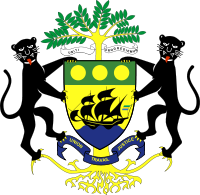


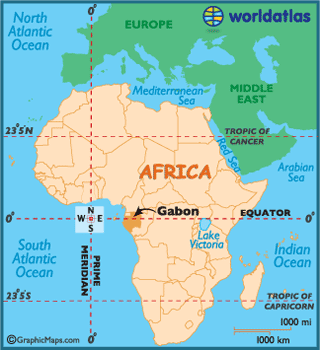
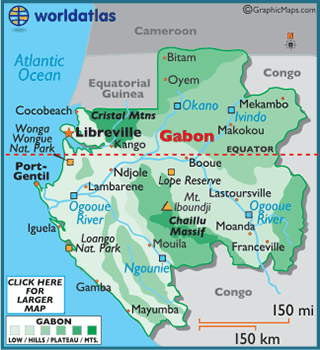
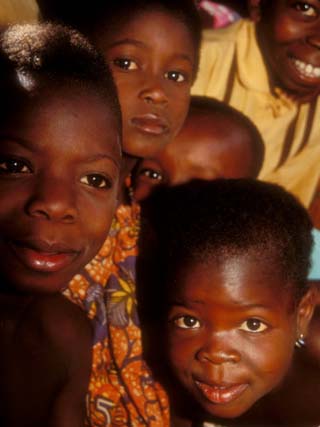


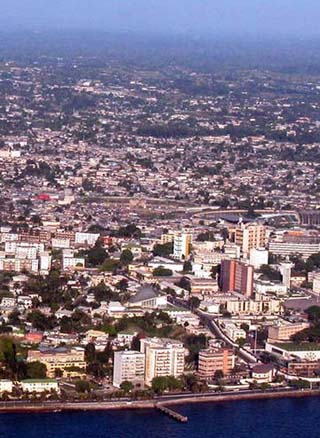
Tel Code..: +241
Ethopian Airlines - Air France- Royal Air Maroc- THY
Viza..: Needs
Courses or boosters usually advised: Hepatitis A; Poliomyelitis; Tetanus; Typhoid; Yellow Fever.
Other vaccines to consider: Cholera; Diphtheria; Hepatitis B; Meningococcal Meningitis; Rabies.
Yellow fever vaccination certificate required for travellers over 1 year of age arriving from countries with risk of yellow fever transmission.
Name: Gabon
President: Ali Bongo Ondimba (2009)
Prime Minister: Daniel Ona Ondo (2014)
Land area: 99,486 sq mi (257,669 sq km); total area: 103,346 sq mi (267,667 sq km)
Population (2012 est.): 1,608,321 (growth rate: 1.977%); birth rate: 35/1000; infant mortality rate: 49/1000; life expectancy: 52.29
Capital and largest city (2009 est.): Libreville, 619,000
Monetary unit: CFA Franc
National name: République Gabonaise
Languages: French (official), Fang, Myene, Nzebi, Bapounou/Eschira, Bandjabi
Ethnicity/race: Bantu tribes, including four major tribal groupings: Fang, Punu, Nzeiby, Mbede (Obamba/Bateke); other Africans and Europeans 10.8%, including 0.8% French and 0.8% persons of dual nationality
Religions: Christian 55%–75%, animist, Islam less than 1%
National Holiday: Independence Day, August 17
Literacy rate: 63.2% (1995 est.)
Economic summary: GDP/PPP (2011 est.): $24.28 billion; per capita $16,000. Real growth rate: 5.6%. Inflation: 1.6% (2011). Unemployment: 21% (2006 est.). Arable land: 1.21%. Agriculture: cocoa, coffee, sugar, palm oil, rubber; cattle; okoume (a tropical softwood); fish. Labor force: 728,100 (2011); agriculture 60%, industry 15%, services 25%. Industries: petroleum extraction and refining; manganese, gold; chemicals, ship repair, food and beverages, textiles, lumbering and plywood, cement. Natural resources: petroleum, natural gas, diamond, niobium, manganese, uranium, gold, timber, iron ore, hydropower. Exports: $10.86 billion (2011 est.): crude oil, timber, manganese, uranium. Imports: $3.239 billion (2011 est.): machinery and equipment, foodstuffs, chemicals, construction materials. Major trading partners: U.S., China, France, Trinidad and Tobago, Netherlands, Cameroon, Belgium, Spain, Australia, Malaysia, China (2010).
Member of French Community
Communications: Telephones: main lines in use: 30,400 (2010); mobile cellular: 1.61 (2010). Broadcast media: state owns and operates 2 TV stations and 2 radio broadcast stations; a few private radio and TV stations; transmissions of at least 2 international broadcasters are accessible; satellite service subscriptions are available (2007). Internet hosts: 103 (2011). Internet users:98,800 (2009).
Transportation: Railways: total: 649 km (2009). Highways: total: 9,170 km; paved: 937 km; unpaved: 8,233 km (2004 est.). Waterways: 1,600 km (310 km on Ogooue River) (2007). Ports and harbors: Gamba, Libreville, Lucinda, Owendo, Port-Gentil. Airports: 44 (2010).
International disputes: UN presses Equatorial Guinea and Gabon to resolve the sovereignty dispute over Gabon-occupied Mbane Island and to establish a maritime boundary in hydrocarbon-rich Corisco Bay.

Inhabited first by the Pygmy people, Gabon was then occupied by the Bantu tribes
prior to being settled by theEuropeans (Portuguese)
in the 15th century.
The Gabon coast grew into a center for the slave trade, bringingDutch, English andFrench traders
to the region.
In the 1800's, the French occupied Gabon.
Gabon was one of the four territories of French Equatorial
Africa from 1910 to 1959, until the territories became independent on August 17,
1960.
Since its independence Gabon has been ruled by three presidents.
Léon M'ba became the first president in 1961, and during his presidency other
political parties were gradually excluded from power; the Constitution was
changed to vest power in the Presidency, press was censored, political
demonstrates were banned and freedom of expression was greatly curtailed.
An army coup in January of 1964, threatened to oust M'ba from power. However,
the French interests
were still strong and French paratroopers
were flown in to quell the rebellion. Within a few days of fighting, the coup
was over and M'ba's powers were restored.
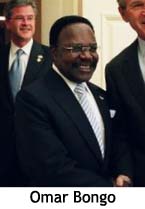 After M'ba's death
in 1967, El Hadj Omar Bongo Ondimba became president, and he put Gabon firmly on
the map as an important future ecotourism destination by designating more than
11% of the nation's territory to be part of its national park system (with 13
parks in total), one of the largest proportions of nature parkland in the world.
After M'ba's death
in 1967, El Hadj Omar Bongo Ondimba became president, and he put Gabon firmly on
the map as an important future ecotourism destination by designating more than
11% of the nation's territory to be part of its national park system (with 13
parks in total), one of the largest proportions of nature parkland in the world.
Ondimba served as president until his death in June, 2009, and two months later
the first ever election in Gabon's history without Omar Bongo as candidate were
held.
In September, 2009, Ali Ben Bongo (Omar Bongo's son) was decalared winner and
elected as Gabon's third president.
Abundant natural resources (namely oil) and considerable foreign support have
helped make Gabon one of the more prosperous and stable Africancountries.
In fact, Gabon has a per capital income of nearly four times the average for
most of sub-SaharanAfrica.
Gabon also exports manganese, iron and wood, trading primarily with the United
States, China and Russia.
The tourism industry of Gabon is widely underdeveloped, and has only begun to be
properly developed by the government. Despite this, tourists flock from all over
to enjoy the beaches and inland fishing, some of the 13 national parks within
the country, the Ogooue River falls, and the Crystal Mountains.

Gabon is easily divided into three distinct regions: a narrow coastal plain, a
hilly mountainous interior, and a savanna in the far-east and south. Of note,
rainforests cover nearly 85% of the country.
The coastal plains form a large section of the World Wildlife Fund's Atlantic
Equatorial coastal forests ecoregion and contain patches of Central Africanmangroves.
Significant mountains include the Cristal Mountains in the northeast and the
central Chaillu Massif (a large mountain mass).
The country also has hundreds of caves located in the dolomite and limestone
rocks formations in the east central areas.
Gabon is drained by numerous rivers; the largest is the Ogooué which is 746
miles, (1,200 km) long.
The highest point of the country is Mont Iboundji at 2,534 ft. (1,575 m), and
the lowest point is the Atlantic
Ocean (0
m).
Climate:
Gabon, located on the Equator,
has a hot and humid climate throughout the year. The hottest month is January,
with an average high at Libreville of 88°F (31°C) and an average low of 73°F
(23°C).
From June through early October there is very little rain, and that trend
generally continues through January. From February through May, heavy rainfall
is common.
Since the 1970s the Gabonese economy has been centered on the oil industry, which has provided it with one of the highest per capita incomes in sub-Saharan Africa and accounts for almost 80% of its export income and 50% of its GDP. Oil wealth, however, led to government corruption, and the population at large has failed to benefit from oil profits. Gabon's economy also is subject to fluctuating oil prices, and it must contend with diminishing reserves. Decreases in production since the mid-1990s have hurt the economy, although it benefited from oil price increases after 2000. The exploitation of forest products and the mining of manganese, which formed the backbone of the economy until oil became predominant, remain relatively important today, and in 2010 the government began taking specific steps to further diversify the oil-reliant economy. The country's most significant forest products are okume (a softwood used in making plywood), mahogany, ebony, and rubber. Other minerals extracted are gold, uranium, and iron ore.
The chief products of Gabon's industrial sector include refined petroleum, chemicals, food and beverages, textiles, and wood products. Despite this economic activity, the majority of Gabonese workers are engaged in subsistence farming, with sugarcane, cassava, plantains, and taro the chief crops. There is also fishing. However, food must be imported to meet the country's needs. Cocoa, coffee, and palm products are produced for export. Few animals are raised, partly because of the prevalence of the tsetse fly.
Gabon's main exports are crude petroleum, forest products, manganese and uranium ores, and cocoa; the principal imports are machinery and equipment, foodstuffs, chemicals, and construction materials. The leading trade partners are the United States and France. Gabon's limited transportation network was improved with the construction (1986) of the Trans-Gabon railway, which links the deepwater port of Owendo with iron ore and manganese deposits.
Gabon is governed under the constitution of 1991. The president, who is head of state, is popularly elected for a seven-year term; there are no term limits. The government is headed by the prime minister, who is appointed by the president. The bicameral legislature consists of the 91-seat Senate, whose members are indirectly elected for six-year terms, and the 120-seat National Assembly, whose members are popularly elected for five-year terms. Administratively, the country is divided into nine provinces.
Much of Gabon, which is situated astride the equator, is drained by the Ogooué River (and its tributaries, the Ngounie and the Ivindo), which flows into the Atlantic through a long and broad estuary. The rest of the coastline comprises a narrow low-lying strip, which, south of the Ogooué's mouth, includes a series of lagoons. The interior of the country is made up of mountain ranges and high-lying plateaus. To the north of the Ogooué are the Cristal Mts. and to the south is the Chaillu Massif, which includes Mt. Iboundji (5,165 ft/1,574 m), Gabon's highest point. In the northeast is the Woleu-Ntem Plateau, which reaches c.2,500 ft (760 m), and in the southeast is the hot and arid Bateke Plateau (c.2,700 ft/820 m).
The inhabitants of Gabon belong to several ethnic groups including the Fang (who make up about one quarter of the population) in the north, the Omiéné along the coast, the Bakota in the northeast, and the Eshira in the southwest. French is the country's official language, but African languages are also spoken, and the country is seeking to increase the use of English. There are large numbers of immigrant workers from other French-speaking African nations, as well as Europeans, mainly French. The population is predominantly Christian in the cities, but most people in the countryside adhere to traditional beliefs.